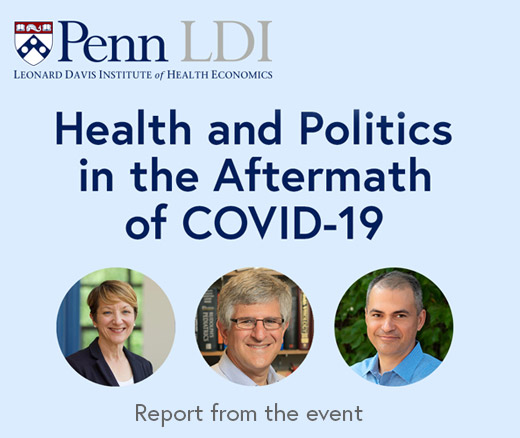
Contradictions That Confuse Federal Food Policies
Announcing Bold New Goals While Crippling the Infrastructure Needed to Achieve Them
Population Health
Blog Post

Parents ensure their newborn gets care, but may neglect their own health, a new LDI study confirms.
Rural parents, in particular, had more hospitalizations and acute care visits and faced more problems getting postpartum obstetric or gynecological care than their urban peers. But parents’ health fared worse than their infants across the board.
“People naturally prioritize their infant’s health,” said LDI Senior Fellow Sara Handley, who led the study. “But parents need to be in good physical, mental, emotional, and financial health to fully care for their babies.”
Pediatric visits may be an opportunity to improve care for postpartum parents, the study suggests. Using an innovative approach that studied parents and infants together, based on evidence of their interrelated health, Handley, LDI Senior Fellow Emily Gregory, and colleagues found that babies had better health than their parents. These findings support the integration of parental care with infant visits.
The study used 2006–2018 data from the National Health Interview Survey, a key public data source for understanding the U.S. maternal health crisis. Since 1957, the Centers for Disease Control and Prevention has conducted the survey to improve the health of Americans.
The data included self-reported information on more than 4,000 rural-residing and more than 25,000 urban-residing parents and infants. The researchers compared rural and urban groups of parents and infants in terms of health status, care utilization, and barriers to care. They also examined rural-urban differences in parent-infant units.
A primary concern from the results was high emergency department use and hospitalizations among rural postpartum parents, according to Handley. About 44% of rural and 39% of urban parents reported at least one emergency department visit in the previous year, and 10% of rural and 5% of urban parents reported a hospitalization. “This suggests unmet health care needs, especially for rural parents,” Handley said. Regardless of setting, postpartum parents reported poorer health overall than infants.
A second key finding was the extent to which all parents prioritized their baby’s health. Delayed care was 14 percentage points higher for rural parents than for their infants and 9 percentage points higher for urban parent-infant comparisons.
A third result, Handley said, was the importance of cost when parents chose to skip their own care. About 8% of rural and 6% of urban parents delayed their own care because of cost, but only about 1.5% of both groups delayed infant care for that reason.
Parents were more likely to be uninsured than their children, and a higher percentage of rural parents experienced stretches of being uninsured than urban parents.
The results paint a grim picture for rural families. About 40% of U.S. births are covered by Medicaid, and 10% of rural respondents and 7% of urban respondents lost insurance after pregnancy. (The study data did not include Medicaid extensions to postpartum 12 months, which began after 2021.)
“We’re generally losing, not gaining, services in rural areas,” Handley said. The upcoming Medicaid changes from the budget bill approved in July mean these problems “are likely to persist and perhaps get worse.”
Combining postpartum parental and infant care led to some parental screening in pediatric settings and improved care for new parents with babies in intensive care, in a project supported by an Optum-LDI pilot grant led by LDI Senior Fellow Heather Burris. Pennsylvania Medicaid now covers perinatal doula services, although Handley expressed concern about the impact of Medicaid disruptions on these types of innovations.
Family medicine could play a key role in combining parental-infant care. Obstetric and neonatal care are generally separate, Handley said, “but family medicine is the exception, and is incredibly important in rural areas.”
Family medicine practitioners may not feel prepared to oversee childbirth, and many rural counties lack an obstetrician or certified nurse-midwife. Recruiting childbirth specialists to rural communities is also important.
Still, with sufficient support, including with billing and reimbursement changes, family medicine clinicians could help provide integrated postpartum parent-infant care that reduces costly parental acute care.
Handley and colleagues continue to examine rural-urban differences in parent-infant risks, care access, and outcomes, focusing on the period around childbirth hospitalization.
The study, Rural-Urban Differences in Health Care Access for Postpartum Parent and Infant Dyads was published on August 3, 2025 in the Journal of Rural Health. Authors include Sara C. Handley, Julia D. Interrante, Emily F. Gregory, and Katy B. Kozhimannil.


Announcing Bold New Goals While Crippling the Infrastructure Needed to Achieve Them

Promising New Evidence and What’s Next

From 1990 to 2019, Black Life Expectancy Rose Most in Major Metros and the Northeast—but Gains Stalled or Reversed in Rural Areas and the Midwest, Especially for Younger Adults

A Penn LDI Seminar Focuses on Why They’re Important for the Future

Former Philadelphia Health Commissioner Warns That Gutting the CDC, Undermining Vaccines, and Politicizing Science Will Leave the U.S. Dangerously Unprepared for the Next Pandemic

From Anxiety and Loneliness to Obesity and Gun Deaths, a Sweeping New Study Uncovers a Devastating Decline in the Health and Well-Being of U.S. Children